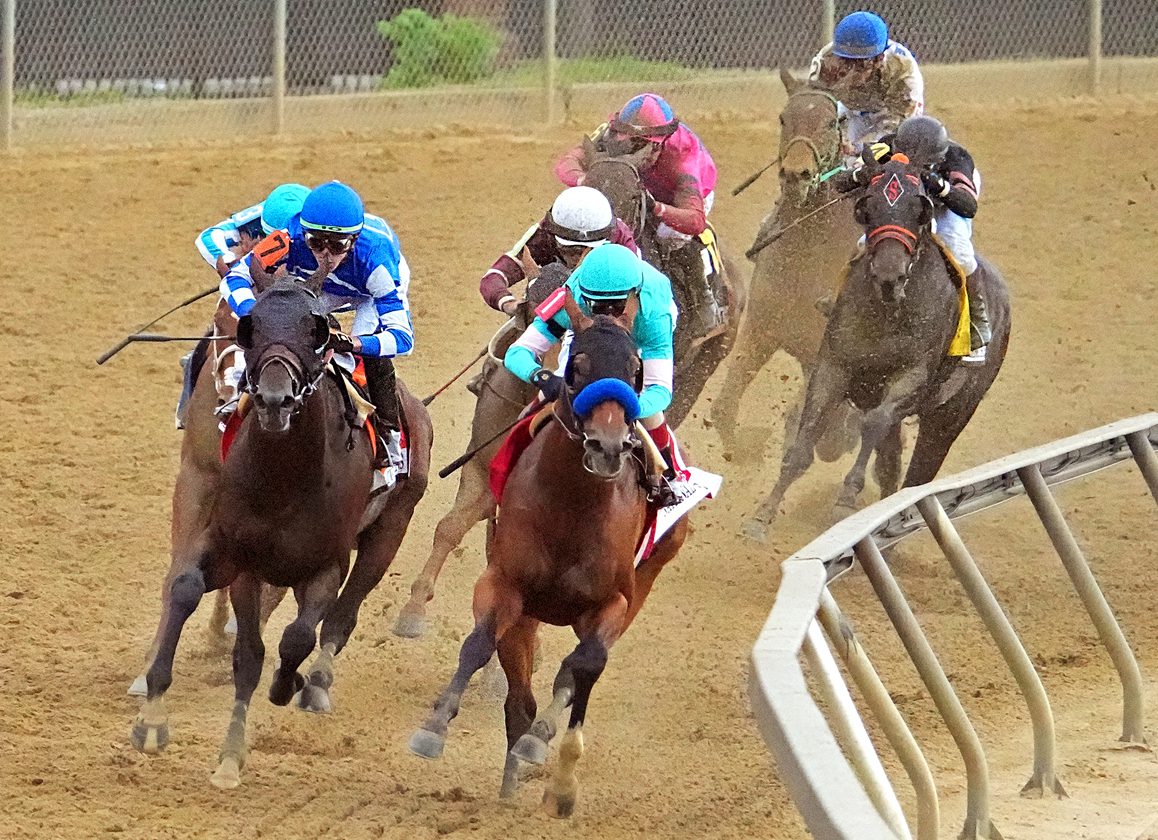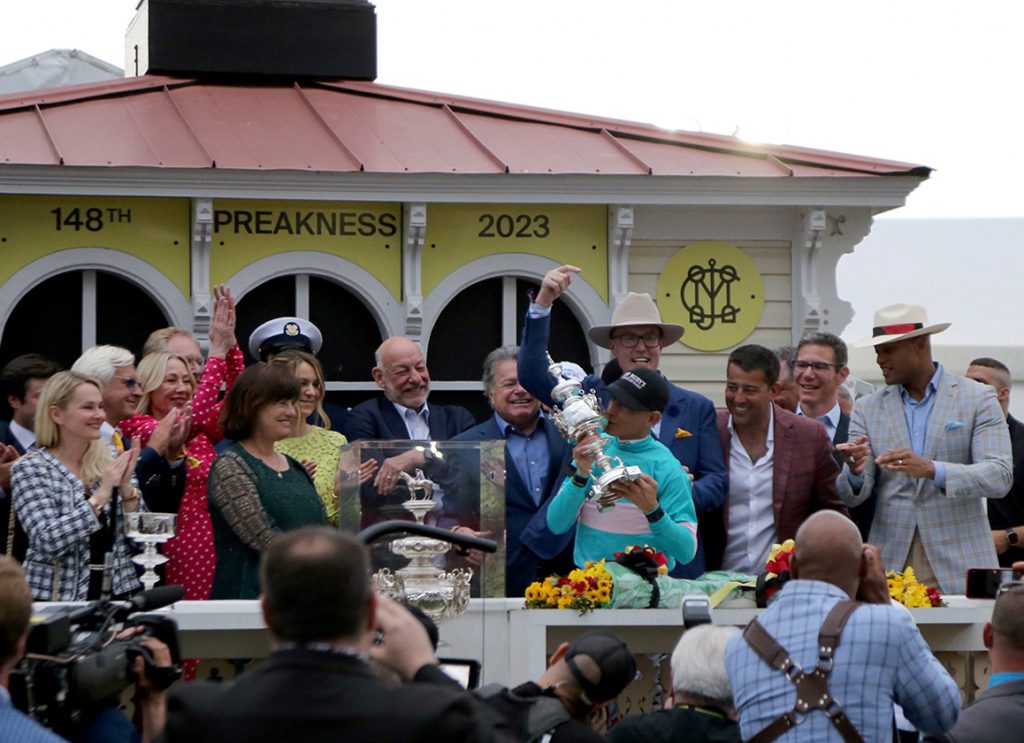As and when he finally quits riding the kids to sleep, at least John Velazquez doesn't have to worry about a next career. Because what he did in Baltimore last week showed him to have everything it takes to lead a cortege. Not just the restrained tempo, but also the way he reliably maintained all dignity and decorum while Irad Ortiz Jr. came lurching out of the procession in his usual unruly fashion.
True, Velazquez wouldn't last the first week if he were to lead a funeral at the same kind of lick as he did the GI Kentucky Derby field on Reincarnate (Good Magic), quite a contrast to the way he has previously hypnotized his pursuers in that race. But Johnny V. amply redressed that aberration with a masterly ride in the GI Preakness S. to confirm himself, for our community, as apt a companion as might be found for a horse bearing a name like National Treasure (Quality Road).
But we won't dwell on the cortege analogy, which will be far too morbid for some tastes in the prevailing atmosphere. This I must admit to viewing with some ambivalence. Because however troubled our relationship with Main Street, unrelieved “sackcloth and ashes” may yet cause us additionally to fail in the more straightforward priority of retaining our existing audience.
(Click the arrow below to hear this column as a podcast.)
Alongside a wholesome determination to keep improving, I do feel that we should stand up for the many glories of our sport with rather more pride than we seem able to find in our hearts just now. (It's like the old joke. Horse walks into a bar. Barman says, “Why the long face?”) We have so much to celebrate, so many stories to discourage mainstream complicity in the kind of extremist agenda that will tolerate zero risk; that would candidly prefer no horses at all, rather than expose them even to the most conscionable and scrupulously-managed risk. That position is invulnerable to the reminder that Thoroughbreds don't make terribly good house pets, so really, we need to concentrate on the far larger numbers who might share the aspiration of giving these noble creatures not just life but the best life possible.
As Californian horsemen, veterinarians and administrators will confirm, that can raise the bar to challenging levels. But their collective efforts have produced such spectacular dividends, turning round an existential crisis virtually overnight, that I feel that the wider community has been inadequately grateful. Major investors in the industry have abandoned the Californian circuit to a pretty vicious circle: small fields, which diminish handle, which restricts purses, which reduces fields. Yet still it keeps coming up with champions, developed by some of the most accomplished horsemen of our time-regardless of where you happen to stand on the one who has just consolidated an incredible resumé with yet another Preakness.
Views of Bob Baffert, in fact, are a good example of all this wringing of hands. It sometimes feels as though you're only allowed to say one of two things: either he exemplifies everything that's wrong, or he's a maligned genius. And whichever camp you find yourself in, get ready for the invective.
All genius is flawed, because all genius is human. We certainly saw a human being last Saturday, but only in circumstances that maintained the bitter polemics. So much of our discourse, above all regarding HISA, is infected with venom; much of it is conveyed, at calamitous expense, by lawyers. But who wants to be invited to a civil war, instead of a garden party?
I do understand that parts of our community will only stir from their complacency if adequately alarmed by the costs of inaction. And yes, too much naïve enthusiasm might blind us to real dangers. It's even arguable that the way the geographical heart of the industry is thriving, in Kentucky, may insulate too much opinion against societal fissures that feel a world away.
Certainly, professional horsemen have their share of culpability in the loss of public traction. As I suggested last week, we're either breeding horses that aren't up to the task; or hiring trainers who won't properly explore the genetic attributes we may wish to replicate. In either scenario, a solution is absolutely within our hands.
But one other thing also needs to be understood by horsemen. You can't have it both ways: you can't refuse synthetic tracks, which are demonstrably safer, and also refuse more exacting regulation. If you won't accept the kind of strictures that redeemed dirt racing in California, then you'll just have to make do with synthetics.
And actually, that whole area is yet another that only tends to disclose division and misunderstanding. One of the main reasons for the perceived failure of the initial synthetics experiment was a prescriptive view of bloodlines, as adapted only to one type of surface. So, whatever our grievances with Churchill Downs, especially regarding Arlington, I'm glad to see them putting their shoulder to the Turfway wheel. Having loaded Turfway with starting points, they were rewarded with a trial winner who ran a brilliant second in the Derby. In the process, remember, Two Phil's precisely emulated his sire Hard Spun. Are we any more likely to take heed, this time round?
While we're on the subject, I'm intrigued that the sire of the Preakness winner has lately surfaced among those extraneous speed influences sampled by Coolmore for their plethora of staying mares by Galileo (Ire). Quality Road's own track career was all about carrying speed on dirt. But his dam was by Strawberry Road (Aus), out of a half-sister to the dam of Bahri (Riverman); and of course, his sire Elusive Quality adapted very well to the European theater. Quality Road has had a couple of Royal Ascot winners, while his daughter Bleecker Street last year emerged as one of the elite grass talents in America. So, it's unsurprising that he should be looking like a promising experiment for Coolmore, not least through his son Cairo (Ire) who runs in a Classic at the Curragh on Saturday.
Actually, National Treasure himself has plenty of chlorophyll in his maternal family, while his first two dams are respectively by sons of El Prado (Ire) and Blushing Groom (Fr). But he's presumably never going to risk grass, when he's not getting anything like enough respect as it is.
The world outside is understandably aghast at our horrible run of breakdowns. But even those turning their gaze inwards just want to tell us what a terrible Preakness it was, and how we're clinging to the wreckage of an antediluvian Triple Crown. It evidently wasn't a “terrible” enough race for the Derby winner to swat aside horses that finished third and fourth in the crop championship at the Breeders' Cup. Sure, that was largely the work of Johnny V.–and emphatically nothing to do with a two-week turnaround-but if these races are so soft, please feel free to go and win one.
So, let's offer due congratulations to this very game animal; to the people who bred and raised him; and to those who found him, and have now brought out his potential. It was a difficult day, for sure, but life is full of ups and downs and horseracing is no different. In fact, that's exactly why its stories are so compelling; and why we must share not just our grief and guilt, but also our joy and pride.
Not a subscriber? Click here to sign up for the daily PDF or alerts.








